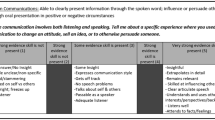Abstract
We performed a pre-post study of the impact of three 90-minute faculty development workshops on written feedback from encounters during an ambulatory internal medicine clerkship. We coded 47 encounters before and 43 after the workshops, involving 9 preceptors and 44 third-year students, using qualitative and semiquantitative methods. Postworkshop, the mean number of feedback statements increased from 2.8 to 3.6 statements (P=.06); specific (P=.04), formative (P=.03), and student skills feedback (P=.01) increased, but attitudinal (P=.13) and corrective feedback did not (P=.41). Brief, interactive, faculty development workshops may refine written feedback, resulting in more formative specific written feedback comments.
Similar content being viewed by others
References
Heckelman FP, Vanek E, Kelly K, Alemagno S. Characteristics of family physicians’ clinical teaching behaviors in the ambulatory setting: a descriptive study. Teach Learn Med. 1993;5:18–23.
Glenn JK, Reid JC, Mahaffy J, Shurtleff H. Teaching behaviors in the attending-resident interaction. J Fam Pract. 1984;18:297–304.
Marvel MK. Improving teaching skills using the parallel process model. Farm Med. 1991;23:279–84.
Salerno SM, O’Malley PG, Pangaro LN, Wheeler GA, Moores LK, Jackson JL. Faculty development seminars based on the one-minute preceptor improve feedback in the ambulatory setting. J General Intern Med. 2002;17:779–87.
Ende J, Pomerantz A, Erickson F. Preceptors’ strategies for correcting residents in an ambulatory care medicine setting: a qualitative analysis. Acad Med. 1995;70:224–9.
Irby DM. Teaching and learning in ambulatory care settings: a thematic review of the literature. Acad Med. 1995;10:898–931.
Heidenreich C, Lye P, Simpson D, Lourich M. Educating child health professionals. The search for effective and efficient ambulatory teaching methods through the literature. Pediatrics. 2000;105:231–9.
Schum TR, Krippendorf RL. Feedback notes: a system for feedback to students and residents. Acad Med. 2000;75:556–7.
Hatala R, Norman GR. In-training evaluation during an internal medicine clerkship. Acad Med. 1999;74 (10 Suppl.):S118–20.
Holmboe ES, Fiebach NH, Galaty LA, Huot S. Effectiveness of a focused educational intervention on resident evaluations from faculty: a randomized controlled trial. J Gen Intern Med. 2001;16:427–34.
Neher JO, Gordon KC, Meyer B, Stevens N. A five-step “microskills” model of clinical teaching. J Am Board Fam Pract. 1992;5:419–24.
Jackson JL, O’Malley PG, Salerno SM, Kroenke K. The Teacher and Learner Interactive Assessment System (TeLIAS): a new tool to assess teaching behaviors in the ambulatory setting. Teach Learn Med. 2002;14:249–56.
Huber PJ. The behavior of maximum likelihood estimates number non-standard conditions. In: Proceedings of the Fifth Berkeley Symposium on Mathematical Statistics and Probability. Berkeley, CA: University of California Press; 1967;1:221–33.
Ende J. Feedback in clinical medical education. JAMA. 1983;250:777–81.
Isaacson JH, Posk LK, Litaker DG, Halperin AR. Resident perceptions of the evaluation process. J Gen Intern Med. 1995;10(Suppl.):89.
Hewson MG, Little ML. Giving feedback in medical education: verification of recommended techniques. J Gen Intern Med. 1998;13:111–6.
Author information
Authors and Affiliations
Corresponding author
Additional information
The opinions or assertions contained herein are the private views of the authors and are not to be construed as official or as reflecting those of the Department of the Army or the Department of Defense.
Rights and permissions
About this article
Cite this article
Salerno, S.M., Jackson, J.L. & O’Malley, P.G. Interactive faculty development seminars improve the quality of written feedback in ambulatory teaching. J GEN INTERN MED 18, 831–834 (2003). https://doi.org/10.1046/j.1525-1497.2003.20739.x
Issue Date:
DOI: https://doi.org/10.1046/j.1525-1497.2003.20739.x




